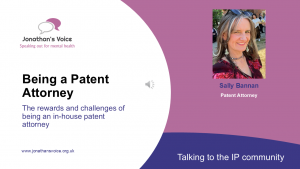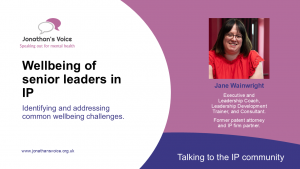On 19 June 2025 Jonathan’s Voice and IP Inclusive held a joint webinar, The Power of Kindness in an Unkind World, to explore some of the evidence that being kind is actually good for your mental and physical health. Our speakers, Penny Aspinall and Barbara Lawton, (Jonathan’s Voice trainers) also thought about what gets in the way of being kind, some suggestions for how we can introduce kindness in the workplace, and the value of self-compassion.
Below is a brief summary of the points about kindness that Penny and Barbara shared.
To read a fuller account of the webinar and see the interesting results of the slido poll go to IP Inclusive website, where the full post first appeared.
The benefits of kindness
There is a lot of evidence that showing kindness to others and ourselves is actually beneficial, both to our mental and physical health. The act of being kind makes us feel good about ourselves and can even lower our blood pressure.
Compassion in leadership
A new approach to leadership using compassion is now being seen as more effective than traditional approaches. Compassion at the core of leadership addresses dual aims of performance and wellbeing; people will perform better if they feel better.
The power of kindness in the workplace
There is a growing recognition that kindness rather than a competitive bullying culture leads to stronger performance at work. A kind and supportive workplace encourages empathy and trust and can lead to better decision making, more creativity and flexibility.
Kindness starts with you
We often speak to ourselves in a way we would never treat others, but self-compassion is an important part of making ourselves feel better and role modelling kind behaviour in the workplace. Try to change the critical and negative language you use when talking to yourself into something more gentle and accepting. Ideas for self compassion on www.self-compasion.org.
What’s the difference between niceness and kindness
Nice is telling people what they want to hear, whereas kindness is telling the truth in a constructive way that will be useful. When someone has made a mistake, being empathetic is important. Be thoughtful about the words and tone you use, and think about your body language.
Accidental unkindness
Unkindness is often the product of busyness. We are all often busy, rushing and under the pressure of deadlines, and it can seem that taking a moment for someone else will get in the way of what we need to do. If we slow down, take a break, reflect and reset before we rush into acting, or take the time to notice how our colleagues are doing around us, it can lead to a more productive workplace and team overall.
Develop good listening skills
Part of compassionate leadership and kindness in the workplace is careful listening. Good listening is hard. If we zone out and don’t pay full attention, the person speaking will feel undervalued. Take the time to pay conscious attention, notice their body language, or changes in their normal behaviour.
Creating a kindness culture in your workplace
Start by being a good role model – looking after yourself, and treating other people kindly. Focus on the part of the organisation immediately around you, and think about any strategies or routines you could introduce such as a shared lunch once a month.
Thank you to IP Inclusive for hosting this webinar and to Anne Burgato for providing such an excellent account of the event.









